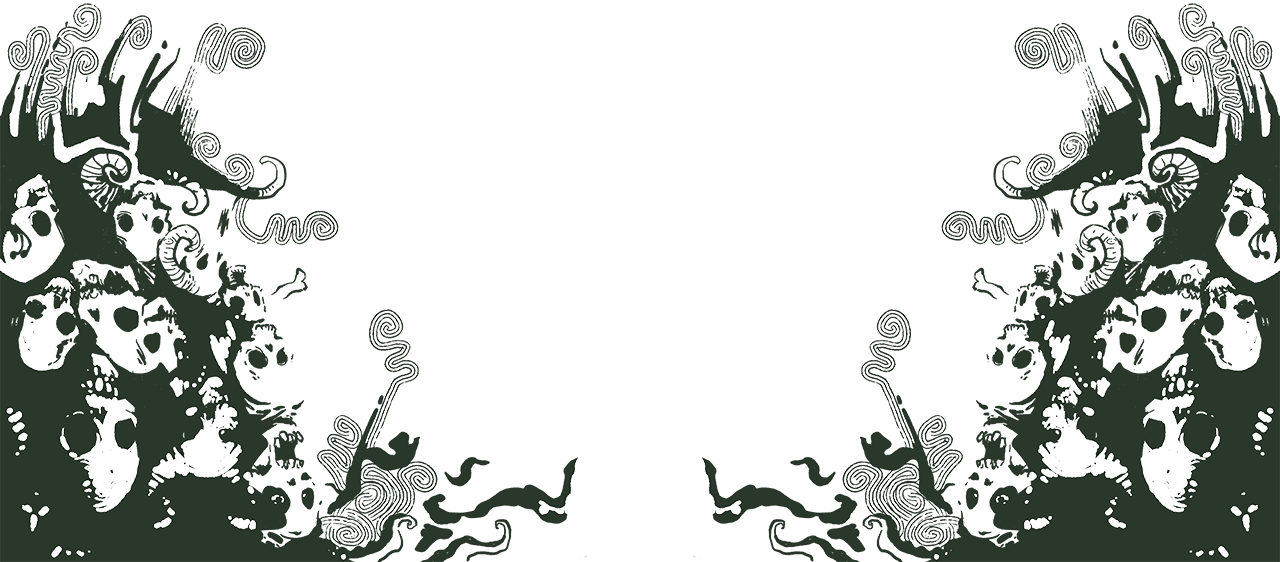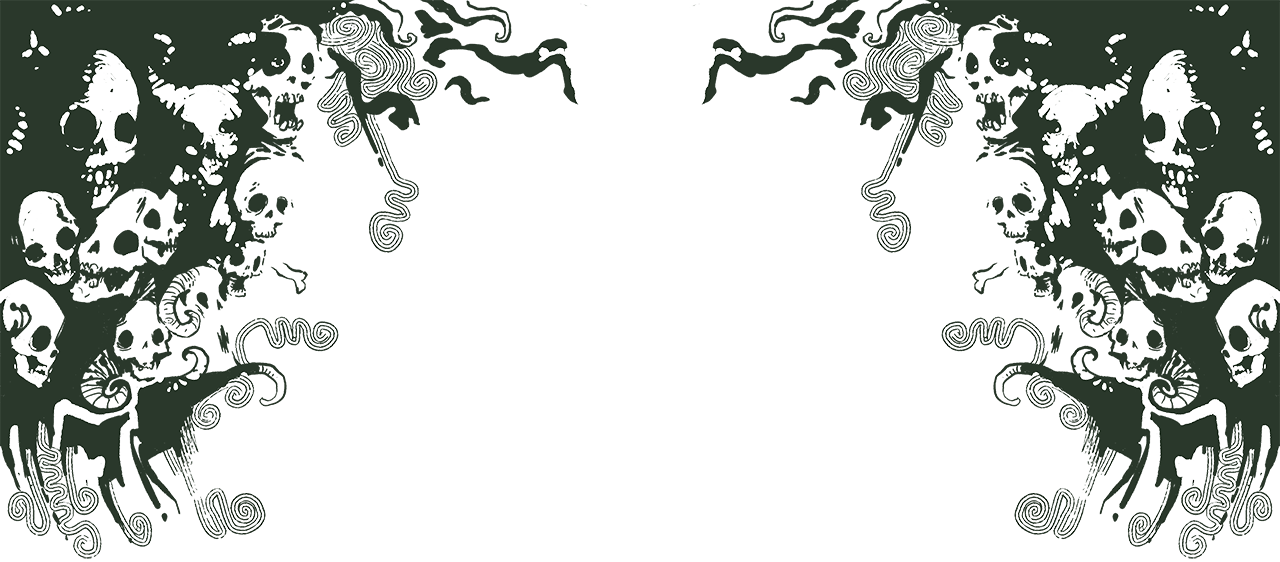
version 0.66 💀

This is still a work in progress! While absolutely playable, there's some content missing. Check the roadmap for more information. If you have questions or any kind of feedback, feel free to join the Discord channel or the Reddit group.
Welcome
Dead Weight takes place in a low-fantasy world - it's very grim and dark but doesn't take itself too seriously. But be advised that Dead Weight has some horror elements, and may not be suitable for everyone.
The player characters are no heroes; they are dead weights - outcasts and treasure hunters with little to lose. They delve deep into long forsaken places, struggling not only with the horrors that lurk there, but also their fatigue, stress, and the gradual decay of the few resources they bring. All in hopes to save enough silver to leave Blacksalt Island for better days elsewhere.
This system has a strong structure to it - focusing on light roleplay and on dungeon crawling. Light roleplay doesn't mean there's no support for it - quite the contrary - it's just that the game system should be fun even if your group doesn't like to roleplay a lot.
Blacksalt Island
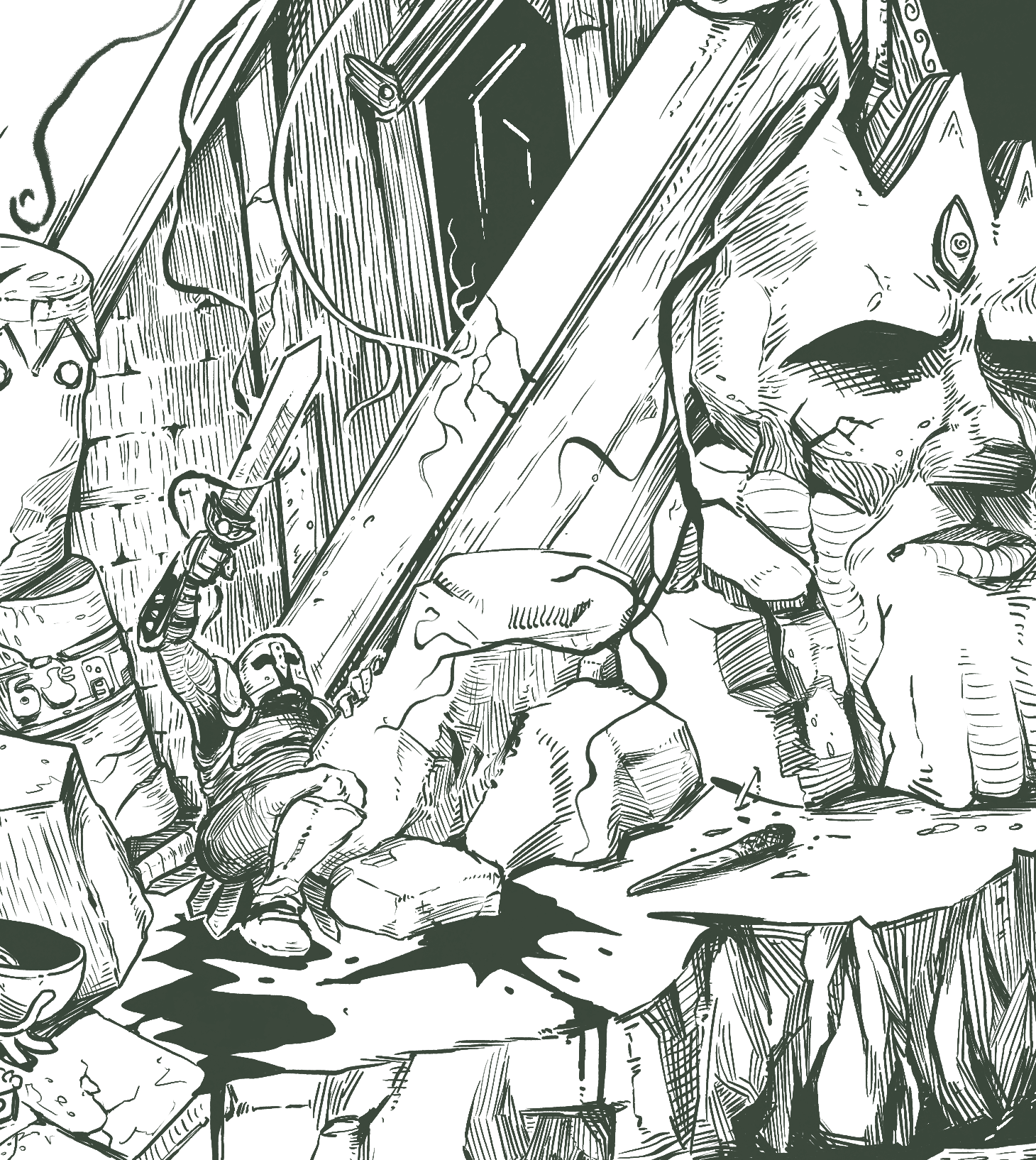
This game takes place in Blacksalt Island, and it's a dreadful place. A once-great kingdom, Blacksalt Island has been ruined by famine, war and plague long, long ago. When things were already dire, the dead vigil started. No one knows exactly why, but every single human that dies in the island rises up as a hungry undead. The island was mostly abandoned for many years, but was recently rediscovered. Treasures and arcane relics found in the tombs sparked a "gold rush" of sorts, with people far and wide venturing there to earn some silver.
Now, the island is divided into dungeoneering guilds, each claiming rights to raid certain ruins. They allow adventurers to explore them and even assist them with supplies, as long as they receive a cut of any treasure found.
Blacksalt Island is a big place, with multiple cities on the shore, hastily built for this exploration venture and a few villages in its core. Of the original inhabitants, very few are left, but some fiefs and hamlets still date back to the time of the old kings.
The ruins are filled with the undead, and the newcomers seem to only add to their numbers. Humanoid creatures also live there, mostly hidden in the shadows and in the forests, like the child stealing goblins and the grotesque gnolls.
Unlike many fantasy worlds, your character is no hero. Quite the contrary, you are someone at the end of the line. Maybe your days of glory are long gone and mostly likely they never came. In one way or another, you don't have much to lose - and that's what brings most people to Blacksalt Island.
You arrived at the island hoping to find something - maybe treasure, maybe some lost artifact, maybe a glorious death.
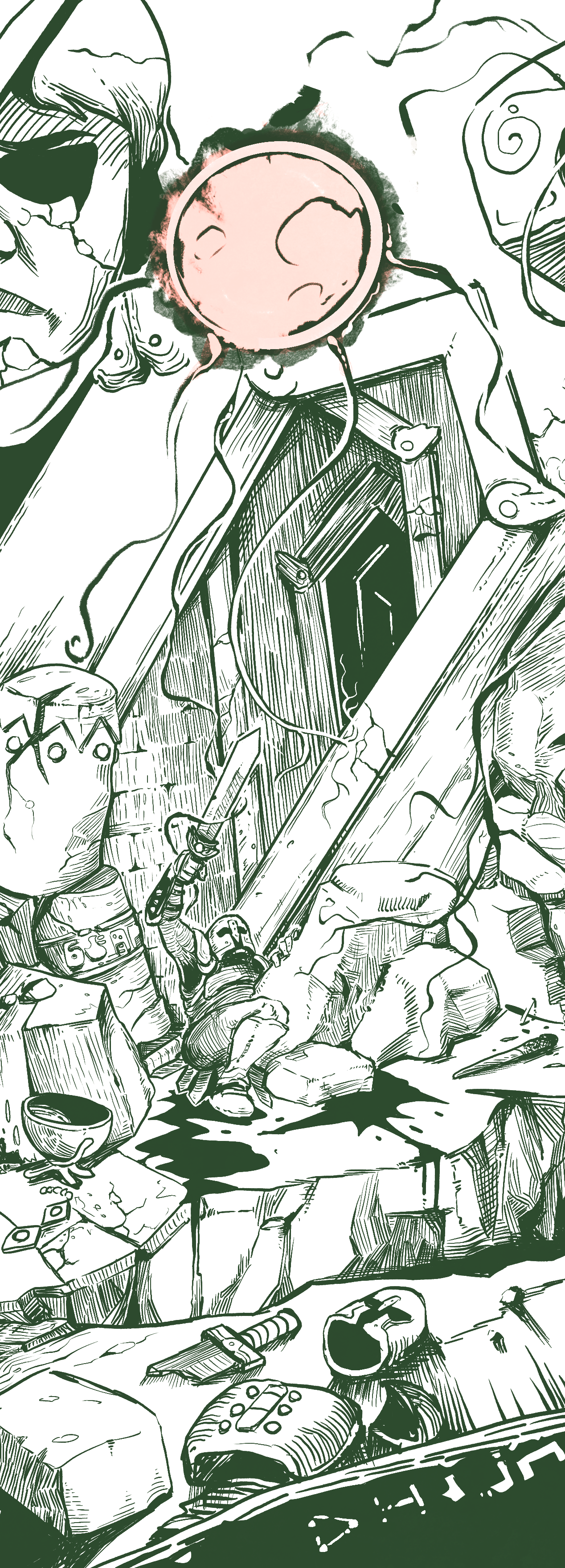
What you will need
Dead Weight is designed with both online and offline play in mind. This rule book has links and a structure optimized for reading online and on mobile, so it's easily accessible to all players. This game is best played with 4 players but you can play with more or fewer depending on your play style. The system is also designed to be roleplay light, meaning it will be fun even without heavy roleplaying, but, if your group likes to roleplay, it also supports that, adding a whole new layer to the game.
For simplicity, the rules are broken up in different books:
- Core Rules: This book covers all the important rules and basic information on how to play and create characters.
- Bestiary: A list of monsters and enemies for the adventurers and their respective stats and lore.
- Blacksalt: A lore guide about the island and the world of Blacksalt, gods, settlements and locations.
- Quick Reference: A compilation of the most used tables. It's useful to have this open on your phone or on a different tab while playing.
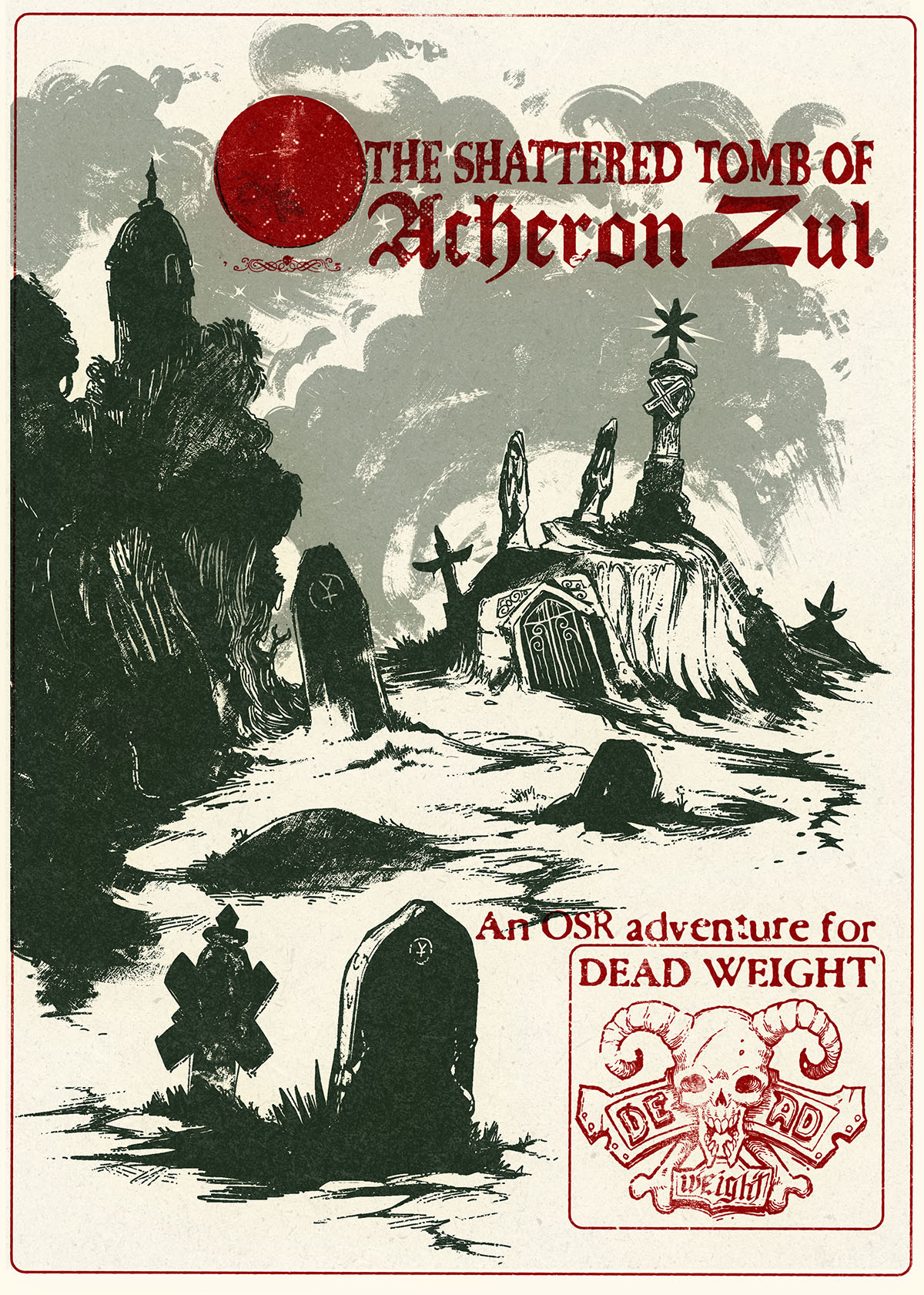
- Sample Dungeon: Players should NOT read this, only the GM. A sample dungeon for a first adventure.
If you've never played a tabletop RPG before, check this video for a basic explanation.
For online play you will need:
- Some voice and text chatting software like Discord or similar.
- A robust online dice rolling software that allows rerolling, like Dead Dice, a dice rolling app I made just for this system. Dead Dice also automates the player's character sheet.
- A virtual tabletop, the simpler the better. I highly recommend Owlbear Rodeo.
- A copy of the character sheet for each player, digital or printed, as the player wishes.
For playing offline you will need:
- You can get a print-optimized version of this page too. We provide in two formats A4 and Letter. (work in progress)
- Pen and paper for everyone.
- A copy of the character sheet for each player, digital or printed, as the player wishes. For digital, the players may use Dead Dice on their phones.
- As many 6-sided die as you can find - ideally 3 per player. Can be played with fewer dice, but it slows the game down. Alternatively, the players may use Dead Dice on their phones.
- A set of RPG dice with a d4, d6, d8, d10, d12 and d20. These are not used very often, so a mobile app can do the job if you don't have these.
- Coins, beans, or anything that can be used as tokens. There are 3 types of tokens: stun, shield and dodge.
- Miniatures or some kind of pawns. Each player will require one and the GM will require some for the enemies. They should be easily identifiable.
About
The goal of Dead Weight is to capture the classic feeling of dungeon crawling tabletop RPGs and board games. It is inspired by many others, borrowing a lot from Blades in the Dark, HeroQuest (the board game), Forbidden Lands, Knave, The Black Hack and Torchbearer.
This system is open source(https://github.com/saint11/DeadWeight) and is released under the Creative Commons Attribution license: you are free to hack, copy, change and even sell works derivative from this system, as long you give proper attribution. The Dead Weight logo cannot be used without express permission, though.
This game was designed and illustrated by me, Pedro Medeiros.
With contributions from:
- Kyle Szklenski(@KyleTheCoder)
The Basics
Let's go over the basics of the system. After that, I recommend that you try to create your first character.
Game Master
One of the players is the game master, which in this book will be abbreviated as GM. The GM is like a narrator and plays all the non-player characters, guides the outcomes of the player actions and creates the details of the world.
The game master has the game master sheet, just like the players.
Players
Everyone else is considered a player. Players each have a character that they roleplay; they will choose the actions of that character and try to keep them alive and move towards that character's objectives.
Adventurers
Characters in Dead Weight are people who either lost everything or didn't ever had anything to begin with - misfit adventurers willing to risk going into the deep vaults of Blacksalt Island to find precious treasures and artifacts while risking their lives and their sanity. There are no heroes in Blacksalt Island.
Characters will level up between expeditions and eventually retire, if everything goes well. Characters can also find an untimely end by something horrible in the depths of the island.
In this book, we will often say adventurers when referring specifically to player characters.
Game Session
This game played in sessions, which can last at least one hour and up to four hours - it depends on the play style of your group. Each game session is structured in 2 distinct states: the expedition and the interlude - delving into a terrible place or recovering and making plans for the next expedition. The players may choose from a list of actions depending on the current game phase. Depending on how much roleplay your group likes, the interlude phase may be simplified or not.
Ok, how do I start?
First, decide who will be the game master and who are going to be the players. The game master should ideally read this whole rule book, including the sample dungeon in the end. It is recommended that the players read at least the Core Mechanics after creating the characters, but it's not required. Players should not read the sample dungeon, or they will spoil the adventure.
Then, each player should create a character; follow the Character Creation chapter for more information.
The GM should also fill the game master sheet to set the tone of the world. At the end of this book, there's a sample dungeon to help the GM get started. The players should not read that section.
After that, the adventure starts! It is recommended to start on the expedition, with the adventurers right outside the dungeon entrance, choosing how they will enter. If you want, you can also start in a village, or city - it's entirely up to you.
Character Creation

Let's start by creating your character - don't worry too much about the rule system for now, just follow the steps from this chapter and choose what you think sounds most exciting. If you really want to know the rules before doing this, you can skip ahead and come back after you've learned the rules.
Every character starts their life with 1 insight point, which they can use to re-roll one or both dice of a life path roll. Some life paths will give you more insight, and later in the game, insight will be used to level up your character. When playing with a group, if your character has the same life path as another character in your party, each player may, only once, roll again without spending insight.
When you complete the last step of your character, you can immediately spend any insight you have left, without even placing it on the character sheet. That is recommended, since you can only earn a limited amount of insight during the whole lifetime of your character. You can see how to spend insight in the playing the game book.
Each step will add and remove attribute points, equipment, and other things to your character. Place them in the appropriate place in your character sheet.
If you get the same skill twice, upgrade it instead. Feel free to jump ahead to the skills, traits and equipment section to understand what they do.
Print a character sheet or use Dead Dice if you want a digital sheet and let's start! Alternatively, you can also try the character generator for an automatic character.
Adventurers have 4 main attributes. They are noted in the character sheet:
- Strength(STR) is physical strength and constitution of a character.
- Dexterity(DEX) is how fast and precise a character is.
- Intelligence(INT) is how intelligent, wise and keen a character is
- Presence(PRE) is how persuasive and strong-willed a character is.
Each attribute has 2 values, score and proficiency. The former is the natural ability and endurance with the attribute, the latter is how well-trained the adventurer is in that particular field. In the character sheet, the square area is for the score and the circle is for the proficiency.
All attributes scores start at 1, while all attribute proficiencies start at zero.
Attributes scores can not go lower than 0 or higher than 3 at any point in character creation - ignore any excess points.
Attribute proficiencies can not go lower than 0 or higher than 2 at any point in character creation - ignore any excess points.
By default, characters start with a belt, canteen and a bag. You also have a few starting items:
- 1d6 torches
- 1 ration
- On 3d! (Risk dice), 1 camping supply
- On 2d!, 1 bandage
- Your class's start items. See Choose your class below.
If no one got a camping supply, someone in the group may receive one.
1. Roll your infancy
Your infancy will provide a base for your attributes and for your formation.
| 3d6 | Infancy | Effect |
|---|---|---|
| 3 | Tossed in the Pit: Rejected by everyone, even by death. | rejected by death (trait), +1 insight |
| 4 | Blacksalt native: Blacksalt is a terrible place, but you know how it can be good, too. | +1 DEX, loremaster (skill) |
| 5 | Occultist’s Apprentice: Raised by an occultist and trained in the arcane arts since childhood. | +2 INT, +1d6 silver, occult studies (skill) |
| 6 | Born in Exile: Raised far away from civilization. | +1 STR +1 INT, survivalist (skill) |
| 7 | Battleborn: Born in an army during a raging war, forged in violence. | +2 STR, fearless (skill) |
| 8 | Street Urchin: Orphan, raised by other kids. | +1 STR, +1 DEX, street wise (skill) |
| 9 | Caravan Child: Born in a trading caravan; learned to haggle before walking. | +2 PRE, +1d6 silver |
| 10 | Clergy Bastard: Born from a sinful union; learned guilt and prayer before walking. | +1 STR +1 PRE, holy rites (skill) |
| 11 | City Kid: Grew up amidst the chaos of a big city. | +1 DEX, +1 PRE, +1d4 silver, +1 insight |
| 12 | Farmer's kid: Life on a farm isn't easy, but gave you enough to keep going. | +1 STR, cooking (skill), animal affinity (skill) |
| 13 | Lost family: You had to grow up much faster than everyone - your siblings depended on you. | +1 INT, +1 DEX, cooking (skill) |
| 14 | Tomb Dweller: Grew up underground in an underground tomb-city. Quickly learned to stay hidden to survive. | +2 DEX, 2d4 silver |
| 15 | Seaborn: Born on a ship of travelling merchants. | +1 INT, survivalist (skill), +2d6 silver |
| 16 | Feral Kid: Raised by animals in the forest. | +1 STR, +1 DEX, animal affinity (skill) |
| 17 | Blue Blood: Born to a rich family that eventually lost everything. | +1 INT, +1 PRE, +4d6 silver |
| 18 | Born of a dark prophecy: No one knows where you came from, only that it's bad. | +1 of a chosen attribute prof, bad omens (trait) |
2. Roll your previous career
What you did before coming to the Blacksalt Isle.
| 3d6 | Career | Effect |
|---|---|---|
| 3 | Deserter Knight: Die for honor? Not a chance. | +1 STR, +1 STR prof, duelist (skill) |
| 4 | Squire: They said one day you would become a knight; you believed them. | +1 STR, +1 PRE, shield master (skill) |
| 5 | Physician: Not many people know how to actually heal someone; you do. | +1 INT, +1 DEX, surgeon(skill), |
| 6 | Traveling Salesperson: Convincing people that they need something they didn't was your full time job. | +1 INT, +1 PRE prof, haggle (skill) |
| 7 | Temple worker: You worked hard in the temples, body and mind. | +1 INT, +1 STR, holy rites (skill) |
| 8 | Boatman: Your boat was your home and your work. You lost count of how many people and wares you transported. | +1 PRE, +1 STR prof |
| 9 | Watchman: Keeping the streets safe was your job, and it was impossible. | +1 STR, +1 DEX |
| 10 | Charlatan: Outsmarting people and taking advantage of them was your specialty. | +1 INT, +1 PRE, 3d6 silver |
| 11 | Brigand: Joined a gang that robs people in the mountains and forests. | +1 DEX, +1 STR, intimidate (skill) |
| 12 | Common Thief: Stealing, lying and hiding. | +1 PRE, +1 DEX, pilfer (skill) |
| 13 | Pugilist: You gave your audience blood and entertainment. | +1 STR, +1 PRE |
| 14 | Beggar: Living on the streets isn't impossible, if you know your way. | +1 DEX, +1 PRE prof, streetwise (skill) |
| 15 | Builder: Building is all about meticulous planning and heavy lifting. You had to do both. | +1 STR, +1 INT prof |
| 16 | Cook: While there are hungry people, you will always have a job. | +1 DEX, +1 INT prof, cooking (skill) |
| 17 | Occultist: One that dares to touch the unknown, a magic user. | +1 INT, +1 INT prof, occult studies (skill) |
| 18 | False Prophet: It's hard not to believe in yourself when so many believe in what you say. | +1 PRE, +1 PRE prof, holy rites (skill) |
3. Roll your tragedy
No one chooses to raid tombs and the unholy places you delve by choice. Tragedy is what forced you into the horrible path of a tomb raider.
| 3d6 | Tragedy | Effect |
|---|---|---|
| 3 | Forced to work in a circus: The things you've seen behind the curtains changed you forever. | +1 DEX prof, -1 INT |
| 4 | Afflicted by the plague: You had to resort to treatment many would consider... unnatural. | +1 INT prof, -1 STR |
| 5 | A murderous impulse: Something was wrong with you, but you are better now. Unlike your victims. | +1 DEX prof, -1 PRE |
| 6 | Pointless meditation: Instead of finding enlightenment, you lost time and all your money. | -1 of any attribute score |
| 7 | In debt with a loan shark: You got the money that you needed, but it cost more than you expected. | +1 PRE prof, -1 STR |
| 8 | Nothing else to lose: | +1 STR prof, +1 PRE, -2 INT |
| 9 | Haunted by visions: No silence. No rest. They are always there. | +1 prof of lowest attribute score, -1 PRE |
| 10 | Lost to the night pleasures: One party blended into the next, until one day your youth was gone. | +1 PRE prof, -1 INT |
| 11 | Enlisted in a war: Fought on the losing side of a glorious war. | +1 STR prof, -1 INT |
| 12 | Went to jail: For reasons just or unjust, you ended up locked away. | +1 DEX prof, -1 STR |
| 13 | Enslaved: Taken by force and worked endlessly until the day you escaped. | +1 STR prof, -1 DEX |
| 14 | Betrayed by the ones you loved: Never again. | +1 prof of any attribute, -2 PRE |
| 15 | Lost everything in a disaster: Whatever your family had now lies in ashes. | +1 STR prof, -1 PRE |
| 16 | A mid-life crisis: There's still time to change, right? There must be. | +1 prof of any attribute, -1 of highest attribute score |
| 17 | Lover's revenge: You had too many lovers and no honesty. One way or another, they made you regret it. | +1 PRE prof, -1 DEX |
| 18 | Caged by a powerful wizard: You witnessed both enlightenment and madness. | +1 INT prof, -1 PRE |
4. Roll your burden
No one comes to the Blacksalt Isle unburdened. Your burden guides your character actions, usually causing problems and complications.
Once per session, you may use your burden to make your character's life harder. Taking a decision that will impact you negatively or when making a test at a crucial point, you can choose to make that test with disadvantage and no proficiency, explaining why your burden made it harder for you. If you do any of these, you earn an insight point. Read more about insight in the character progression chapter in the playing the game book.
| 2d6 | Burden |
|---|---|
| 2 | Naive dreams of glory: The world needs a hero. Since no-one ever volunteers, you often do. |
| 3 | Fear of loss: You already lost enough and will do what you need to keep the few things you have. |
| 4 | Reckless: Blacksalt can be a fresh start or a quick end. |
| 5 | Martyr: Always volunteer for taking risks for others. |
| 6 | Fame and riches: You want out of this life - you want a better life. You need it. |
| 7 | Restless: Never wants to stop, always wants to press on. |
| 8 | Redemption: You can no longer live with the things you've done; maybe you can redeem yourself in Blacksalt. |
| 9 | Zealous Fury: Blacksalt must be cleansed of any diabolical presence, no matter the cost. |
| 10 | Amnesia: You don't know how you got here, you just woke up here one day; you are often confused. |
| 11 | An Heir: Your family is waiting for you: you will come back for them - they are counting on you. |
| 12 | A Soul Sold: You are going to hell, and you know it. Do your actions even matter now? |
5. Roll your features
This is a strong aspect that your character has. Besides the advantages and disadvantages that these characteristics will give you, this will help you to roleplay and imagine how your character acts and looks. These are not the only features of you character - you are encouraged to create more. If you and the GM agree, you can choose this instead of rolling.
You may write this down in the notes section of your character sheet.
| 4d6 | Quirk |
|---|---|
| 3 | You wear unusual glasses (valuable). Can't see properly without them. |
| 4 | Loud snore. Add 1 extra ambush dice when sleeping in camp phase or do not recover sleepy. |
| 5 | Irritable, when prompted you always must choose the angry affliction. |
| 6 | Coffee addict. You only recover sleepy if you had coffee at least once this expedition. |
| 7 | You are much taller than most people. |
| 8 | You are always picking your teeth. |
| 9 | Very entitled. |
| 10 | You have absolutely no sense of humor. |
| 11 | Your eye color is somewhat unnatural. |
| 12 | You are very clean and tidy. Something most people in Blacksalt aren't. |
| 13 | You always have an annoying smirk on your face. |
| 14 | You are constantly scratching yourself. |
| 15 | You have a really long hair. |
| 16 | Bad leg. Limps a bit when distracted, but with no real downside. |
| 17 | Conspiracy theorist. |
| 18 | You look like you didn't sleep properly. Messy hair and dark circles around your eyes. |
| 19 | Only whispers. |
| 19 | Very short, smaller than most people. |
| 21 | You have a huge scar on their face. Get advantage when intimidating. |
| 22 | Horrible sense of direction; if left alone, will get lost. |
| 23 | Extremely patient. When you would get angry, roll 2d!; if triggered, do not get angry. |
| 24 | Deep and murky past. Once during a camp phase, may unveil your true past. Reroll your infancy and apply the new result instead of the current one. |
6. Choose your class
Classes will give special skills to your character. Choose one and follow the instructions for each class. After that, your character is done!
There are 4 main classes. Each class has a specific background that you must also choose. They are all in the Blacksalt book.
Check the skills and traits section to understand what each of your traits and skills do. Make sure to also check how your equipment works on the equipment and items section. You may also spend your gold on equipment and items before the mission starts, but you may not sell items before the first mission.
Warrior
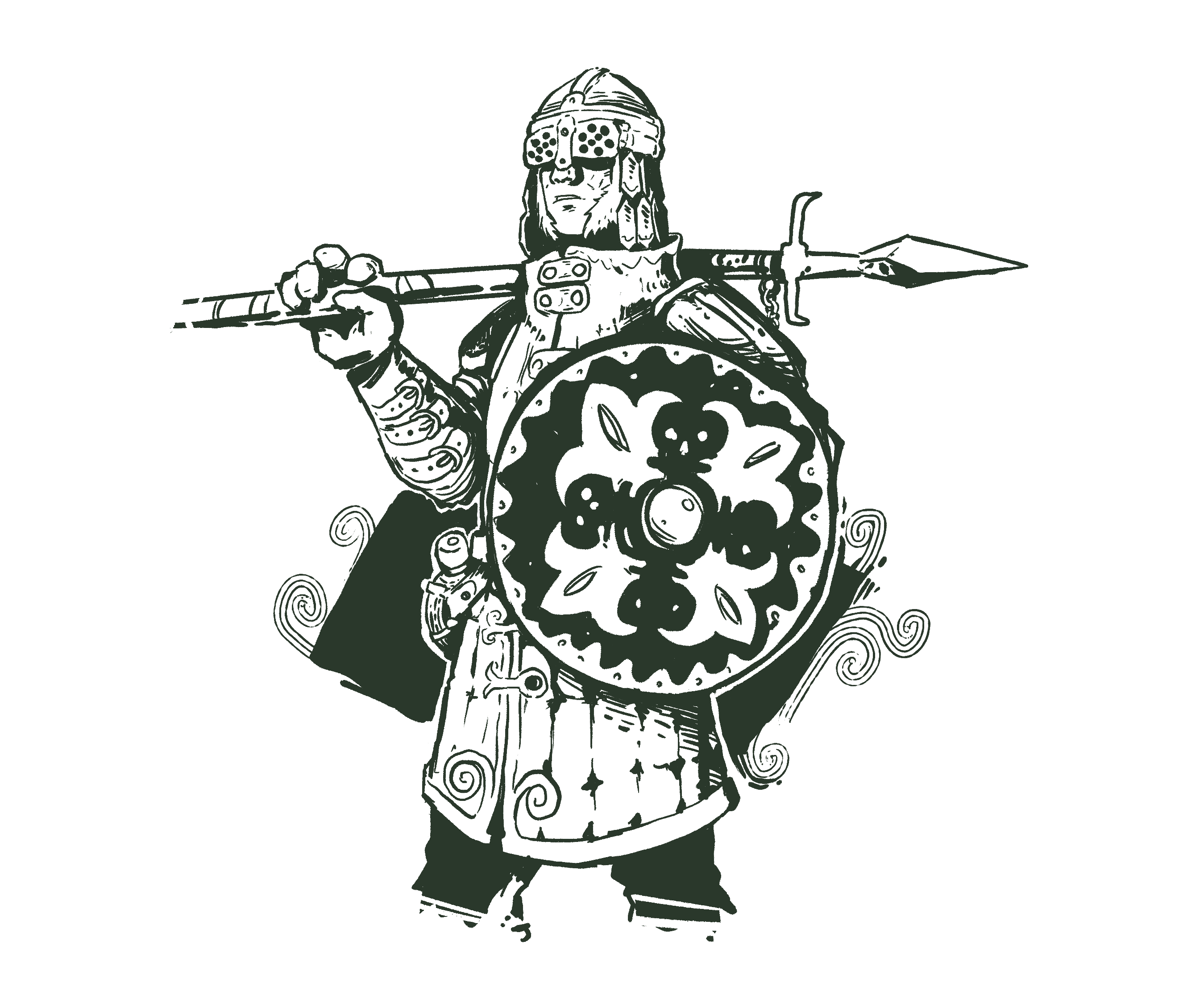
Trained in dealing with violence, warriors are the first one in a combat and the last ones out. Warriors can use any armor or weapon.
- Add 1 proficiency point to Strength.
- Warriors can use any weapon or armor.
Warrior background
Warriors can come from different backgrounds, dramatically changing their fighting and living style. For your special trait and equipment, you must choose a warrior background:
Combat maneuvers
Warriors must choose their combat maneuvers. They can choose 1 from the maneuver list in their warrior background. During combat, they may use those maneuvers freely, as many times as they want, as long they have the required actions for them. Maneuvers require 1 action and hit close targets, unless specified in its description.
Thief
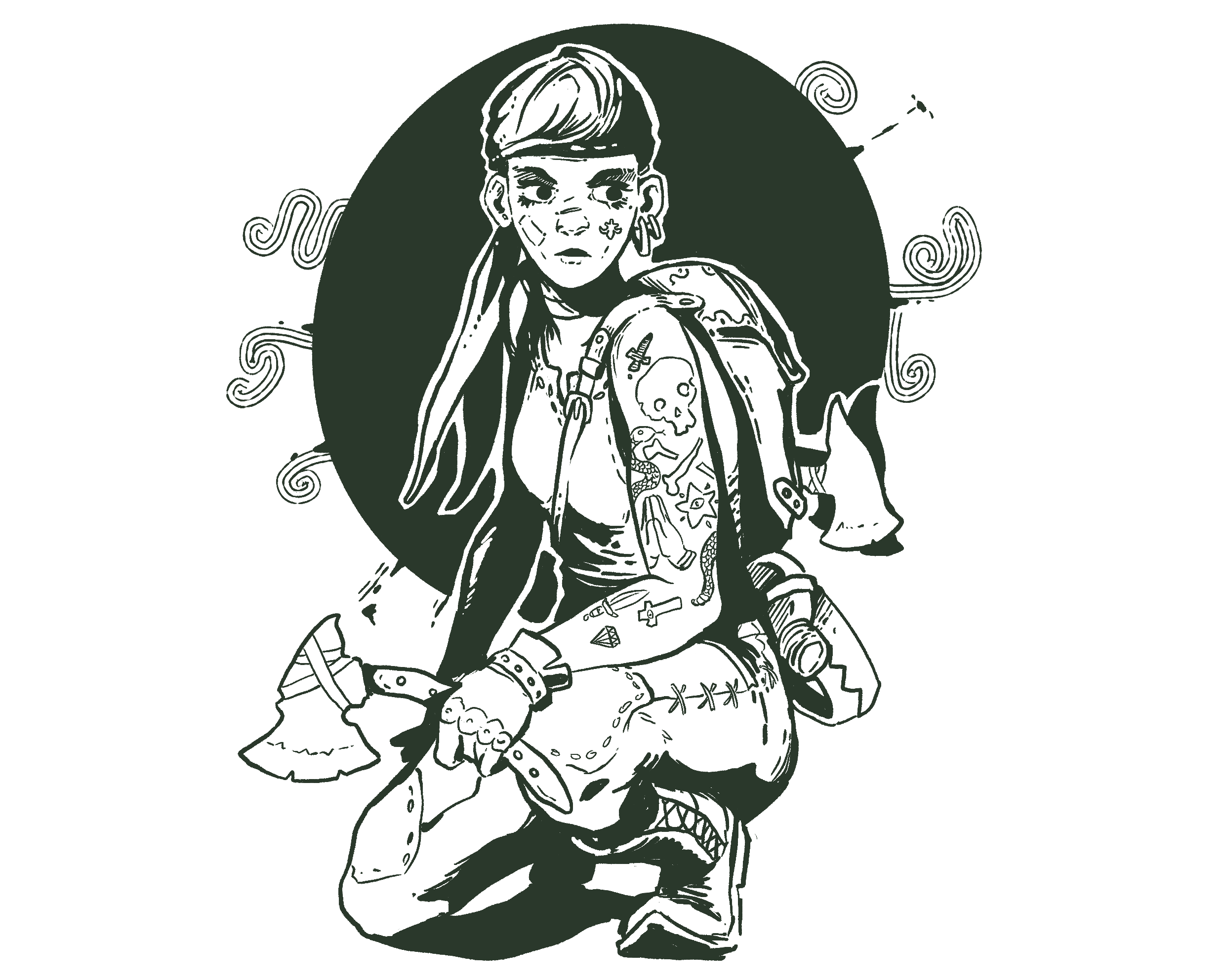
- Add 1 proficiency point to Dexterity.
- Thieves can use one-handed melee weapons, staves, any ranged weapons and medium armor
Thief background
Thieves can come from different backgrounds, dramatically changing their fighting and living style. For your special trait and equipment, you must choose a thief background:
Combat maneuvers
Thieves must choose their combat maneuvers. They can choose 1 from the maneuver list in their thief background. During combat, they may use those maneuvers freely, as many times as they want, as long they have the required actions for them. Maneuvers require 1 action and hit close targets, unless specified in its description.
Wizard
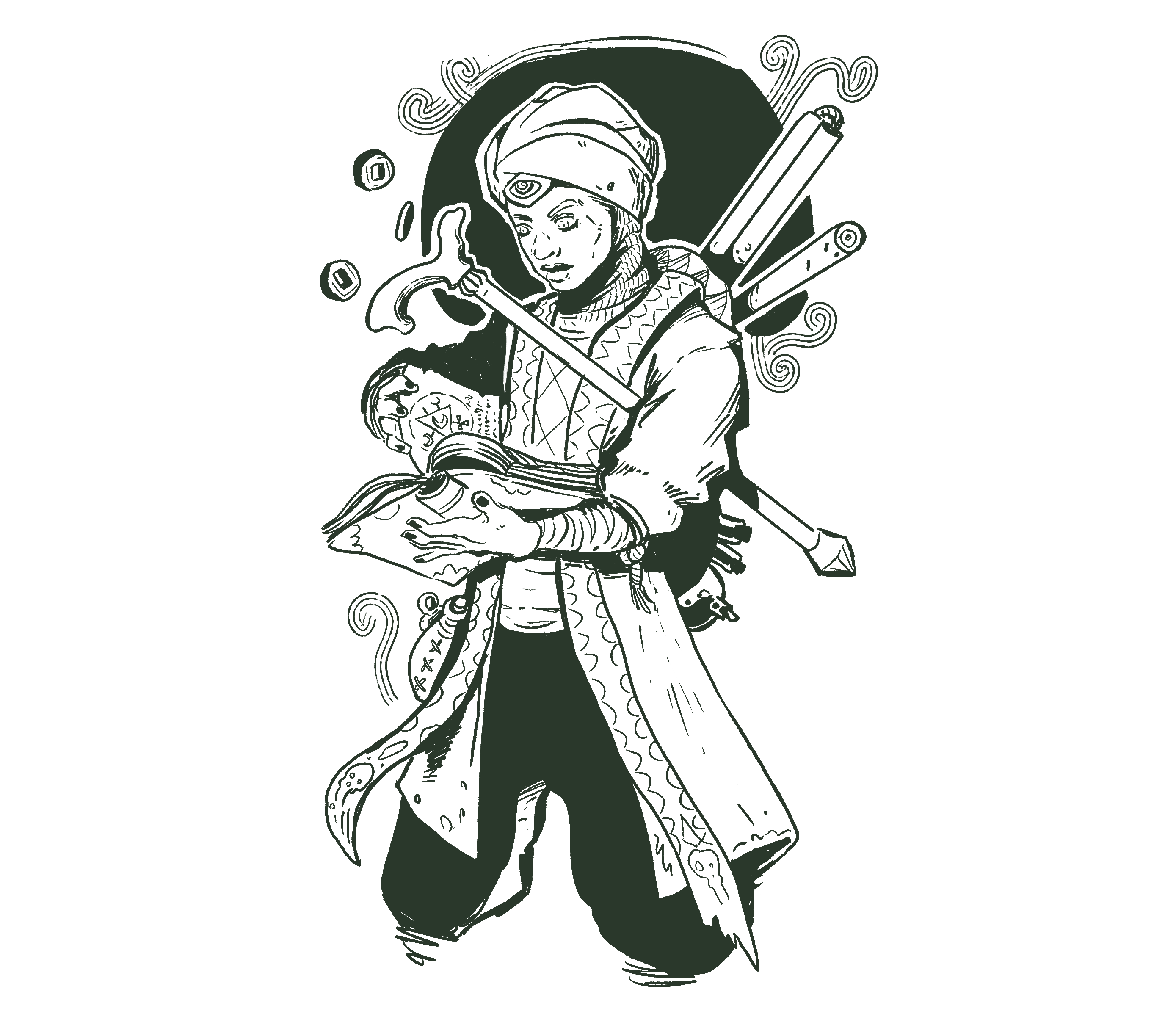
- Add 1 proficiency point to Intelligence.
- Add the trait magic user.
- Add skill lore master.
- Wizards can use only small, one-handed weapons, staves and light armor.
School of magic
Choose one of the following as your school of magic:
- Necromancers of Yadar
- Alchemists of the Golden Ridge
- Thaumaturgists of Ravenhome
- Wandering Mystics
- The Awakened
You can choose a different conductor or grimoire, if the GM allows it.
Spells
Wizards must choose a number of spells equal to their intelligence score from the spell list from their school of magic. Check the Blacksalt book for that list. Write them down on your character sheet under the "spells and prayers" section.
Wizards require a conductor to perform their spells, usually a wand, staff or crystal ball. Conductors help them to channel the magic from the void plane to the real world. While casting a spell without a conductor is possible, it's extremely dangerous. When casting without a conductor, any failure counts as a critical failure.
Wizards also need a grimoire to store their spells; without a grimoire, they can't study during the interlude or camp phase to remember forgotten spells. In some cases, the grimoire and the conductor are the same.
When the expedition starts, the player must choose which spells the adventurer will have memorized. One spell can be memorized for each intelligence point.
Casting a spell is always guaranteed to work: after the spell effects are resolved, the player must do an intelligence test:
- On a success, nothing else happens. The spell was cast as intended.
- On a failure, the caster forgets the spell.
- On a critical failure, roll from the spell mishap table. Keep track of how many mishaps have occurred during this expedition. Add that number to the dice total.
- On a great success, you tap into an arcane well. Your next spell will be an automatic success.
| 3d6 + Previous mishaps | Effect |
|---|---|
| 3 | Take 1 fatigue point on intelligence and receive the Nauseated affliction. |
| 4 | A loud noise! Advance the doom tracker. |
| 5 | Temporary blindness for 6 exploration turns. |
| 6 | You see a world without you, and it's better. You now have the Shaken affliction. |
| 7 | Summon a lesser demon Close to you. |
| 8 | Everyone Nearby receives the Angry affliction; you receive the Terrified affliction. |
| 9 | Everyone Nearby starts crying and receives the Hopeless affliction. |
| 10 | You and everyone Close have terrible visions and receive the Terrified affliction. |
| 11 | Summon a void demon Close to you. |
| 12 | You start bleeding from your eyes; take 1 wound to each attribute and the Bleeding affliction. |
| 13 | Your conductor is now destroyed. |
| 14 | You see a giant eye looking at you. Receive the Doomed affliction. |
| 15 | Summon a tormentor demon Close to you. |
| 16 | A third eye opens in your forehead; you are Cursed. This does not count as the Third Eye special trait. |
| 17 | You quickly teleport to the void realm and back, but all your equipment and items stay there. |
| 18 | Summon an endless horror Nearby. |
Cleric
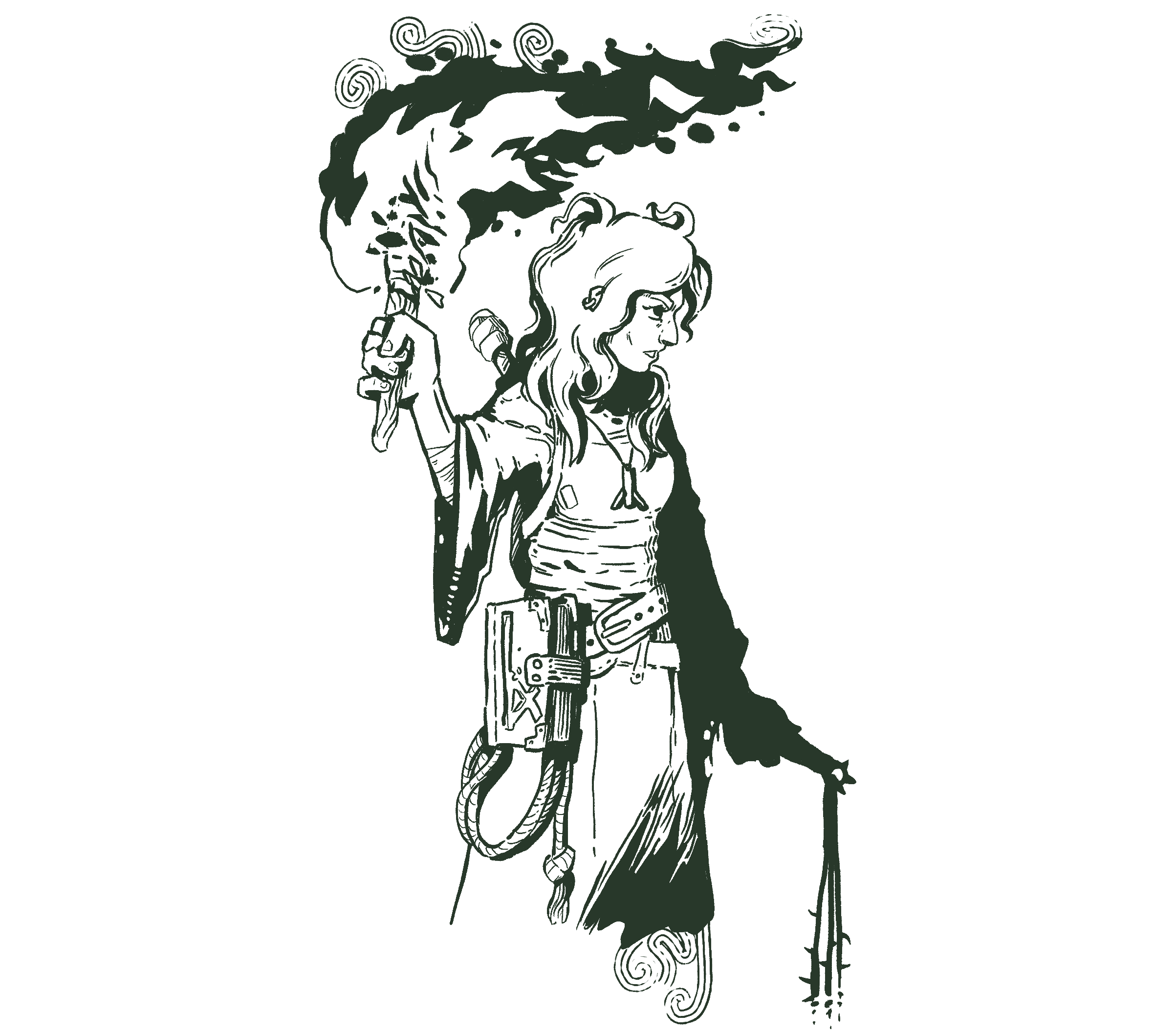
- Add 1 proficiency point to Presence.
- Add the trait divine mandate.
- Clerics can only use one-handed weapons, staves, bows, crossbows and medium armor
Gods
Choose one of the following gods for you to follow. That will determine your starting equipment and spells:
Clerics must choose a god to follow; you can see the list of gods in the Blacksalt book. Clerics must also choose a number of prayers equal to their presence score from the basic prayers list or from their god's prayers. Write them down in your character sheet under the "spells and prayers" section.
Prayers
Clerics require a holy symbol to cast a prayer; that symbol depends on the god that the cleric follows. Casting a prayer without a holy symbol doesn't work, but they are usually easy to improvise.
When the expedition starts, a player must choose which prayers the adventurer will have memorized. One prayer can be memorized for each presence point. Each prayer may only be used once until the adventurer rests at camp: once a prayer is used, it is considered to be exhausted. Once per expedition, the cleric may do a desperate plea and use an exhausted prayer once.
Casting a prayer is not guaranteed to work, since the gods can be cruel sometimes. Make a presence test when your adventurer tries to cast a prayer:
- On a success, the prayer is answered; resolve the effects as usual.
- On a failure, the prayer is ignored; don't do anything. Ignored prayers do not exhaust them.
- On a critical failure, you have angered your god; it won't answer any prayers until you make a sacrifice.
- On a great success, you also receive a miracle; roll from the miracle table.
| 1d6 | Effect |
|---|---|
| 1 | You heal 1d6 wounds of you or someone Nearby. |
| 2 | You heal all wounds or fatigue on one attribute of you or someone Nearby. |
| 3 | Unexhaust all prayers. |
| 4 | Cure one of the following afflictions from you or someone Nearby: Hungry, Parched, Bleeding, Nauseated or Cursed. |
| 5 | If you are in combat, all monsters try to flee in fear; if not, decrease the doom tracker. |
| 6 | If you are in combat, all enemies take 1 wound; if not, your group will start the next combat with one shield token on each adventurer. |
Every cleric can choose prayers from the basic prayers and from the prayer list from their god. Check the gods list for the prayers of each specific god.
Basic prayers
- Cure Light Wounds: Heal 2 wounds from a Nearby target. Also removes bleeding.
- Light: Illuminates the current room.
- Create food and water: Creates 1 unit of ration and water.
Core mechanics
Game Structure
A game of Dead Weight runs a bit differently than most tabletop RPGs. It follows a strong structure, with two main states.
The game usually starts in the Expedition phase, with the adventurers raiding a dungeon or some other terrible place in the Blacksalt Isle.
Dice Notation
Like many tabletop RPGs, Dead Weight uses dice notation to specify when and how you should roll your dice. Most die rolls are common six-sided dice, unless specified otherwise.
When you see d4, d6, d8, d10, d12 and d20, this is referring to a die of that size; d4 is a four-sided die and d20 is a twenty-sided die. Let's review all styles of dice notations we will use in this book:
Adding dice (2d6)
When you see 3d6, that means roll three six-sided dice and add the result.
Usage dice (Ud8)
Usage dice track consumable use. For instance, Throwing Daggers (Ud8) have a d8 usage die. Every time the consumable is used, the usage dice are rolled: if the result is a 1 or 2, that die is downgraded to the next smallest value in the following chain:
d20 > d12 > d10 > d8 > d6 > d4
If you roll a 1 or 2 on a d4, that item is gone: you just used the last one.
Risk dice (1d!)
Risk die are usually for checking if something unpredictable will happen. Roll the indicated number of d6; if any show a 1, that thing happens.
Attribute Tests and Checks
Rolling dice in Dead Weight is a dangerous and strategic activity. In general, players want to get away with actions that do not involve testing. Testing is usually exhausting for the characters, and in the dungeons, fatigue is deadlier than most blades. The GM may ask you to perform a test when your character tries to do something difficult, uncertain and has consequences.
Rolling dice also involves decision making: carefully choosing which dice to reroll is an important part of the game and helps your character to take difficult actions with different approaches.
Testing is always done in relation to a character's attribute. For example, trying to break down a door would require a test of strength. To do so, players must roll the same amount of dice as the score of the tested attribute. A character with a strength of 3 would have 3 available dice for a strength test. Players may always choose to roll fewer dice, or to not roll at all, failing the test.
The player needs to roll a 4, 5 or 6 on at least one die to complete the task successfully. If the player rolls more than one 6 on the dice, that's an great success and things go exceptionally well for that character. On the other side, if the player fails and rolls one or more 1 on the dice, that's a critical failure and things go exceptionally poorly for that character. 6s override 1s.


A successful roll example.

A failed roll example.
Beware that if any of the rolled dice is 4 or 1, the player will receive one fatigue point to that attribute, and only one, even if the test succeeded.

A success, but with a fatigue cost.

Another success, also with a fatigue cost.

A fail roll that also has a fatigue cost.
Rerolling dice is a common thing in Dead Weight. Many things, like character skills and dangerous situations will allow the players and the GM to reroll certain dice. The order of rerolls is always dynamic: players may choose to use their rerolls one by one, react to the GM rerolls and vice-versa. The test is only evaluated when both sides can't, or agree not to, reroll any more dice.
Here is an example of an attribute test:
Amber wants to climb down a rope, so the GM says that she will require a dexterity test. She has a dexterity score of 4, and she decides to roll all 4 dice.
She rolls
Since she rolled a 6, the test is a success. She manages to climb down the rope safely. Unfortunately for Amber, she also rolled a 1 and a 4; since that happened, she should receive one fatigue point to her dexterity.
If you are really into statistics, you can check the chance of critical failure, failure, success and great success here and the chance of fatigue here.
Wounds and fatigue
Every time a character receives fatigue points, apply them to an attribute.
Each fatigue or wound point that the character has on that attribute reduces the available dice of that attribute by one.
If a character needs to receive a fatigue point and that would make the available dice of that attribute lower than zero, convert one fatigue into a wound to that attribute; that wound can not be reduced by armor and other resistances. Read Receiving Wounds for more information.
Proficiency
Players may reroll a number of dice if they have proficiency on that attribute. For example a character with 2 points in intelligence proficiency can reroll 2 dice when testing for intelligence. Players may choose to use their proficiency dice one at the time.
If you choose to reroll a dice, you must use the new result, even if it's worse in any way.
Having a high attribute score is always good, but having proficiency is where things get interesting in Dead Weight. The rerolls usually make for interesting and difficult decisions.
Keeping it Safe
If the player doesn't want to risk fatigue, they can reduce their roll by 2 dice. If they do, rolling 1 or 4 will no longer exhaust the attribute, unless the test fails. This must be announced before the dice are rolled. You cannot use extra effort when you are keeping it safe.
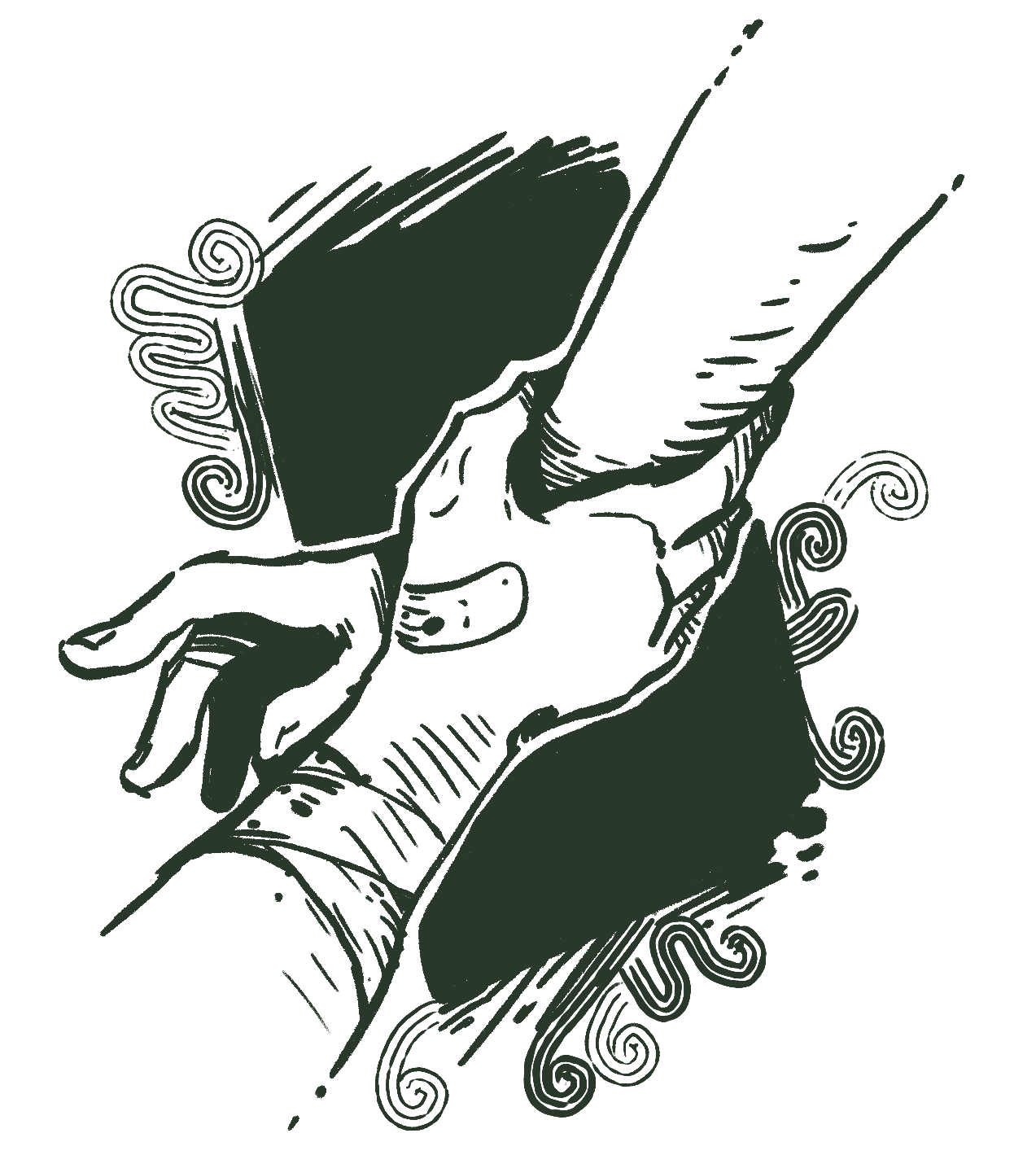
Receiving Help
Characters can help each other with a task, if they choose to do so. The player must explain how their character is helping the other in a way that makes sense for the action. The GM and the rest of the table must agree that the situation is plausible. This must be announced before the dice are rolled.
A character can only receive the help from one other character, unless the GM specifies otherwise. The helping character should roll one die; that dice will contribute to the main roll. If the helping character has a proficiency on that attribute, they can use it to reroll that dice. The character performing the main roll may not change that dice in any way.
Note that any fatigue generated by that dice should be received by the helping character only.
Negative consequences of a failed task are also suffered by the helping character, where applicable, but not the fatigue rolled by the main character.
Extra Effort
If the player really wants to succeed, it is possible to add one more dice to the available dice pool by causing the character one fatigue in the appropriate attribute. The player must announce that extra effort is being used before rolling the dice. A character cannot spend fatigue if it would cause the character to receive a wound as consequence of doing so.
Players may (not?) use extra effort after rolling the dice.
If the player is already going for the extra effort, rolling a 1 or a 4 will not cause fatigue, since they are already receiving that point.
Zero Dice?
If, for any reason, you need to roll zero dice, you should roll 2 die instead and take the lowest number instead. Rolling less than zero dice is also possible: roll 2 die and add one extra dice for each value below zero. For instance, when rolling -3 die, roll 5 die (2+3) and choose the worst. I'm pretty sure that test will fail, though, sorry.
For simplicity, the GM may declare a -2 or lower roll to be an automatic failure.
Checks or Tests
Sometimes a rule will call for a check, such as an initiative check. Checks work exactly like tests, except that rolling 1s and 4s on this test do not cause fatigue.
Proficiency can be used normally in checks.
Advantage and Disadvantage
When a test describes an especially easy or difficult action, the GM may give players an advantage or disadvantage. Many combat actions and enemy abilities will also add an advantage or disadvantage to tests.
- Advantage allows the player to choose one die from the test or check to reroll. The new value must be used.
- Disadvantage allows the GM to choose one die from the test or check to reroll. The new value must be used.
The players or GM may always choose not to reroll a dice for advantage or disadvantage, respectively.
Advantage and disadvantage will nullify each other if for any reason a test would have both; they can also stack: having advantage or disadvantage multiple times allows the players or GM to reroll multiple dice.
The GM must announce that the test has advantage and/or disadvantage before the dice have been rolled.
Receiving Wounds
Characters will often receive wounds from various sources. Most wounds can be reduced, usually by armor or some character traits. Wounds received by fatigue cannot be reduced.
Armor
Making an armor roll is a bit different than making a test.
If your character has armor, it will have a number of armor points, abbreviated as AP.
To use armor, roll one dice per armor point: for each 4, 5, or 6 reduce the damage by one. For each 1 or 4 rolled, that armor takes damage and will lose 1 armor point until it's repaired. Players may always choose to roll fewer or zero armor dice.
If the adventurer is wearing multiple pieces of armor, like a helmet and a vest, only one piece of armor can be used to defend each attack. The player chooses which piece to use.
Some armors are notated like this 2, 2 AP with 2 or more numbers. This means that each "part" of the armor should be used individually. In the example armor, the player may not roll 4 dice at the same time, only 2. Those parts break individually, too.
Zael just received 2 wounds from an arrow and decides to use his reinforced leather armor (2 armor points) to 2 dice. The new results are 1 and 6, which reduces the damage to only 1 wound, but the armor is damaged and now has only 1 armor point until it's repaired.
Placing wounds
When receiving wounds, you must choose one or more attributes on which to place them. If an attribute already has fatigue points, you may convert those to wounds instead of adding wounds when placing each point.
Zael now just received 3 wounds from an sword attack and managed to reduce it to 2 wounds using armor. After some consideration, he decides to place that damage on the presence attribute, which already had 2 fatigue; that fatigue is now converted to wounds.
Attributes can't hold more wounds than their score.
Sometimes a rule will force the player to place the wounds on a specific attribute. If the specified attribute can't hold that many wounds, ignore the excess and the character will immediately collapse and faint. A common example for this is when receiving fatigue on an attribute that's already filled with wounds; this would make the character break down from exhaustion.
If no attribute can hold any more wounds, meaning that all available dice have been reduced to zero, and another wound must be placed, that character gets mortally wounded. Most wounds are considered lethal, but sometimes a character will receive a non-lethal wound. When that happens, a character will not be mortally wounded when receiving that damage; all excess points should be discarded and the character just faints.
Mortally wounded characters don’t die immediately, but they cannot take any actions and must be stabilized by someone after the combat. If a mortally wounded character receives any more damage, that character will die.
Enemies don't have attributes, so there's no need to choose where to place the wounds when receiving them. Enemies die when receive more wounds than noted in their enemy sheet.
If the received wounds are reduced to zero or less by armor or other resistances, that character doesn't take any wounds.
Fainting
When a character would receive a fatigue or would point but it is impossible to place it, they immediately faint. Then, the character cannot move or take any actions. Wounds continue to be placed as normal.
Keep track of how many wounds were discarded when you fainted. You stay fainted for at least that amount of turns (combat or exploration turns). Discard all stun tokens while in this state. After waiting you may roll 1D! to try waking up by yourself.
Outside of combat other characters can stabilize you with a first aid kit, medical supply or healing spell and wake you up.
Mortal Wounds
When a player character is mortally wounded, that player must roll from the mortally wounded table.
- Add 1 to the dice result for each time the character was mortally wounded during this Expedition.
- Other game effects can also add or subtract from that value.
A mortally wounded character is unable to move or perform any actions. That character must be stabilized with a first aid kit, medical supply or healing spell to wake up. If your character already has the trauma you would receive, ignore it.
| 1d6 | Effect |
|---|---|
| 0 | Nothing but a scratch! You stand your ground and do not fall mortally wounded. |
| 1 | Knocked out, but no lasting consequence. See fainting. |
| 2 | This injury won't heal how it should. Receive the chronic pain trauma. |
| 3 | Choose and receive a trauma you don't currently have. |
| 4 | You bleed internally. Receive the brain damage trauma. |
| 5 | You see the other side. Receive the visions trauma. |
| 6 | On the verge of death! If not stabilized in 1 combat turn, you are dead. No lasting consequences. |
| 7+ | You are dead. |
Special Tests
There are some particular cases where attribute tests won't work. Let's see some solutions to those problems.
Player opposing tests
What happens if there's a player versus player situation? In that situation, both players must perform the appropriate attribute test. The attribute is chosen by the GM, depending on the situation (an arm wrestling match would require strength, a race would use dexterity).
If one player succeeds and the other fails, the one that succeeded won. If there's a tie, roll again until only one is victorious.
Player attacking players
In the rare situation where a player character attacks another, either my mistake or by evil intent, the attacking player must roll a test using the attribute currently notated on the weapon or attack. Alternatively, if the GM and players agree, a different attribute that fits the situation better can be rolled, but it's always the attacker that rolls the dice.
Non-player characters opposing tests and attacks
When a monster, or any character not directly controlled by the player attacks another, you can also run into problems, since they don't have attributes. To solve this, use their level as the attribute score instead.
Core Concepts
Attributes
Character attributes in Dead Weight specify how good your character is at something.
Attributes have two numbers, the score, which measures your character endurance and natural talent with that attribute, and the proficiency, measuring how well trained your character is at that attribute. Every character has 4 attributes.
- Strength (STR) is physical strength and constitution of a character. It also influences how many items a character can carry.
- Dexterity (DEX) is how fast and precise a character is. It is used mostly in ranged attacks, initiative, dodging and in a variety of tests.
- Intelligence (INT) is how intelligent and wise a character is. It also influences how many spells a character can memorize.
- Presence (PRE) is how persuasive and strong-willed a character is. It also influences how many prayers a character can memorize.
Attributes can also have fatigue and wounds. A good way to write those down in your sheet is to make a single line for fatigue and an "X" for a wound. During combats your character will probably receive and recover fatigue often, so using small markers like coins, beans or a dice might be easier; you can write down your fatigue after the conflict is resolved.
Skills
Skills mainly give your character extra abilities to use during the expedition and interlude. But they can also be extremely valuable for gathering information and interacting with the world. With the loremaster skill, for example, the GM may give you extra information on the dungeon history, or, with the ritualist skill, the GM might tell you how to remove a curse you received. Skills are a good opportunity for the GM and players to exercise their creativity while coming up with stories.
Some skills can be upgraded: remove the previous skill before learning the advanced one so it only occupies one slot. They are the indented ones below, for clarity. You must always learn the basic skill before the advanced one.
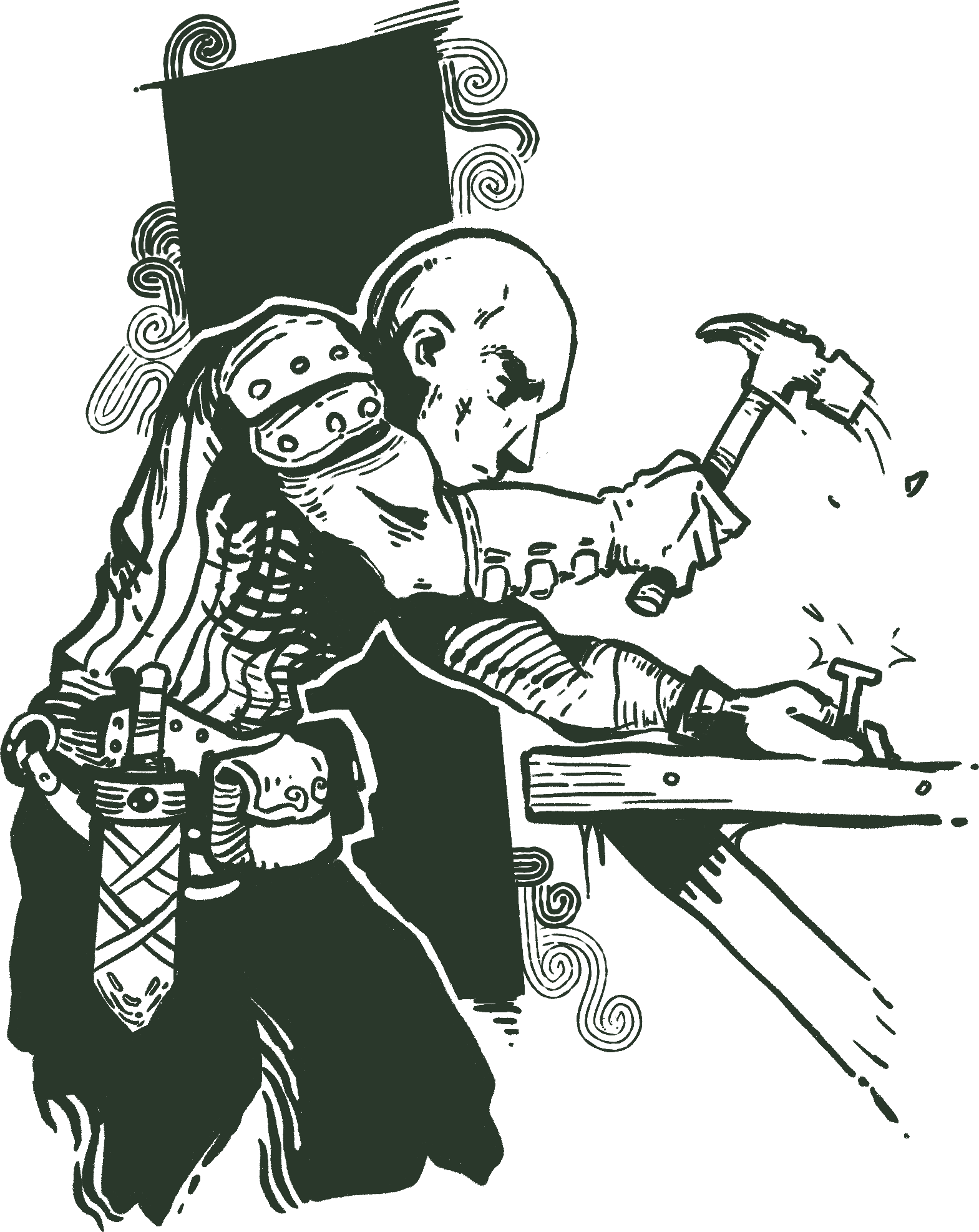
- Animal Affinity: You have advantage when testing for anything that involves taming, understanding or tracking wild animals.
- Beastmaster:(advanced) You have advantage for anything that involves fighting, taming, understanding or tracking animals. You have a pet that follows you around (medium ally).

- Ward the dead: May perform a ritual using 1 exploration turn to ward the dead vigil within a circle of radius 1 meter. Does not affect anything that the dead vigil has already set, only prevents it from happening the first time.
- Cooking: Each ration can feed an extra adventurer in the camp phase. You get 1 free ration at the start of the interlude.
- Master Chef:(advanced) Each ration can feed two extra adventurers in the camp phase. You get 3 free ration at the start of the interlude.
- Crafting: You have advantage when testing for crafting things. During the camp phase, you can repair 2 points of armor automatically.
- Duelist: You may perform a feint action in combat (1 action). Discard all shield and dodge tokens from your enemy.
- Swashbuckler:(advanced) If your feint removes a shield token, your opponent may not attack next turn.
- Fearless: Once per combat, you may heal one presence wound.
- Haggle: During the interlude you can reroll the price of an item once. You must use the new result.
- Trade network: During the interlude, you can reroll the price of an item once. You may choose to use the new or the old result. You may also reroll the item availability once.
- Holy Rites: You have an extensive knowledge about the new gods, prayers and the saints. You may make holy water using clean water and 1 exploration turn.
- Infiltration: Allows the search for traps action without proper tools during expeditions and an advantage when sneaking.
- Intimidate: You may perform an intimidate action in combat (2 actions), attacking with PRE 1N against all nearby enemies. Only one intimidate action can be used per combat.
- Loremaster: You have an extensive knowledge about the world history, languages and different cultures.
- Pilfer: You earn 1d6 silver coins at the start of the interlude.
- Occult Studies: You have an extensive knowledge about old gods, magic and the occult.
- Ritualist: During camp phase, you can spend 1 action to remove one point from the omens tracker or doom tracker.
- Shield Expert: Add 1 extra shield token when defending.
- Shield Master: (advanced) Add 1 extra shield token when defending. Moving does not remove shield tokens.
- Stalker: Before combat, if undetected by an enemy, you have a free critical hit.
- Street Wise: You cannot get robbed in the interlude, and you have one extra daily action. You may reduce the price of common items by 1 silver (to a minimum of 1).
- Surgeon: During the camp phase, you may perform an Intelligence test to heal one wound from each character in your group.
- Survivalist: Gain 1 extra proficiency point for anything that involves surviving in the wilderness. Adds 1 extra camp action.
- Slippery: You may spend dodge tokens during the enemy turn to move one tile.
- Veteran: (1 explorer action) Test presence: on a success, you will know how much doom this location currently has, and how much doom is required to trigger the next step.

Special Traits
Special traits are similar to skills, but usually add or break a rule for your character.
- Berserker: During combat, ignore strength fatigue and wounds when rolling tests. You still take wounds and fatigue normally, and so your character will collapse in exhaustion if your available dice go lower than zero.
- Bad omens: Every time you have a critical fail on a test, advance the omens tracker.
- Battle trance: Every time you kill an enemy, you get an extra action.

- Cold blood: You may back-stab enemies that are engaged in combat with another character or distracted, for which you may use Dexterity to hit with weapons that would require Strength. Enemies can't use resistance to reduce your damage, and you cause one extra wound.
- Divine mandate: You may cast prayers. You require a holy symbol, and must have previously memorized them. Check the prayers section for more information.
- Hardened: When receiving wounds from an attack, you may test strength: on a success, resist 1 wound. On a great success resist 2 wounds.
- Magic user: You may invoke spells. You require a magic conductor, and must have previously memorized them. Check the spells section for more information.
- Rejected by death: If your character would get mortally wounded, roll 2d!: if triggered, ignore the mortal wound.
- Dauntless: When you get a success on a test, you may roll 2 extra dice and add them to this test. This increases your great success and fatigue chance.
- Third eye: You can see the omens tracker.
Traumas
Traumas work similarly to special traits, except that they are always very bad for the adventurers. Traumas are usually received when the character gets mortally wounded. Most traumas can be recovered or at least downgraded to a more manageable one.
Receiving the same trauma again has no effect.
- Broken arm: Can't use one arm for attacking or carrying items.
- Broken leg: Movement reduced to 1 tile and costs 2 actions in combat. Moving during expedition must be done with help or some sort of cane.
- Chronic pain: You just can't seem to focus. Reduce one point on one attribute score that is not already zero.
- Brain damage: Reduce one proficiency point on one attribute that is not already zero.
- Paranoid: Can't receive help from allies, and can't share items other than rations in the camp phase. -1 ambush dice in the camp phase.
- Fearful: During combat, if you are attacked, you move one tile back. If you are attacked more than once, you get 1 (and only 1) stun token.
- Visions: When someone casts a spell nearby, you receive a stun token.
Afflictions
Each affliction has their own set of rules on how they affect the character and how they are removed. If an adventurer would receive an affliction he or she already has, ignore it.
| Afflictions | Effect | Getting rid of * |
|---|---|---|
| Hungry | Wounds do not heal. | Eat food. |
| Parched | Cannot recover fatigue. | Drink water. |
| Bleeding | Receive one fatigue point every turn. | Use bandages or some other form of first aid. |
| Sleepy | Can't use extra effort or help friends on tests. | Camp or drink coffee, or receive a wound in combat. |
| Angry | Can't reroll your dice with proficiency. | Drink a cup of tea or hot chocolate. |
| Shaken | Can't use the Catch Breath action in combat or during exploration. | Rest in the camp phase. |
| Nauseated | During combat, you have one less action. | Some potions and tonics. Healed in the interlude phase. |
| Terrified | Rolling a 4 on attribute tests doesn't count as a success. | Drink wine or other alcoholic drink, or defeat a challenging foe. |
| Hopeless | Rolling a 5 also causes fatigue. | Escaping alive from the dungeon or survive a challenging fight. |
| Cursed | Wounds do not heal by resting. Can see ghosts. | Only removed by magic or miracles. |
| Plagued | Coughs constantly. When receiving fatigue, receive a wound instead. | Only removed by magic or miracles. |
| Doomed | When the doom tracker moves, it moves one extra point. | Only removed by magic or miracles. |
* Not exhaustive: always check item and spell descriptions for more ways to remove afflictions.
Inventory
Characters can carry 7 items + 3 items for each strength score. Items should be placed on your character sheet in the appropriate slots in the Trappings section. While carrying more items is possible, the character will become encumbered, and all movement is reduced by half. You must perform a strength test every turn, and failing means some item was dropped, chosen randomly.
At the trappings table, on top of each list, there's a label, something like "Belt/Small pouch". Circle any items your character has; if your character doesn't have any of the listed items, cross out the whole list.
Here's a breakdown of how the adventurers can carry their items:
- A bag carried on the back can carry 4 items; a backpack can carry 7 items.
- A belt can carry 1 item; a small pouch can carry 2 items.
- A canteen can carry 1 liquid item; a skin can carry 2 liquid items.
- Each small bag can carry 3 items.
Unless stated otherwise, all characters start with a belt, a canteen and a bag.
When items have a characteristic that makes them awkward or hard to carry, write it below the item, with the characteristic occupying one extra slot. Examples of characteristics are oversized, fragile and unstable.
Very small items, like chalk, keys or a dice do not occupy any slots, and should be written down in the notes section of the character sheet.
Characters may also carry items in their torso and hands slots.
- The torso has 4 slots.
- Each hand has 2 slots.
Equipped armor and helmet go on the torso slots; wielded items, including torches, go on the hands. Unless the player has a really good explanation, a character can only wield one item in each hand, even with 2 slots. For simply carrying stuff, carrying 2 items in each hand is fine.
The character's clothes that are not considered armor do not occupy a slot. You can write them down in the notes section.
Distance
Most weapons, skills, spells and items will have a maximum or minimum range to work. To simplify things, we will use some abbreviations, instead of listing the numbers every time. There are 4 range types for measuring distance in Dead Weight:
Close, Nearby, Far and Distant.
When using a grid map, here's how you can convert distances:
| Distance | Meters | Squares |
|---|---|---|
| Close | 1.5m | 1 square, no diagonal |
| Nearby | 9m | 6 squares |
| Far | 20m | 12 squares |
| Distant | more than 20m | 12 squares |
Trackers
Also known as a progress clock in other systems, a tracker is just one or more circles divided into segments that the GM uses to track the progression of something. Every time a tracker is advanced, one segment must be filled. When the circle is completely filled, the tracker is triggered and something happens. There are 3 main trackers that are always in play:
- Decay tracker: Represents the toll that dungeon delving takes on the adventurers. Causes hunger, exhaustion and other bad things to the players. Advances every turn.
- Doom tracker: There's one for each dungeon, representing the dungeon "waking up" to the adventurers' presence and reacting.
- Bad Omens tracker: There's one for the whole campaign. Represents the adventurers' terrible luck and their inevitable doom in Blacksalt island. Every time it gets completed, something really bad happens.
The Playing the Game book explains in more detail how each of these trackers work, so don't worry about them for now.
The GM can also create more trackers at any moment, to represent long challenges, the tide rising, a strong enemy slowly waking up and so on. Trackers can be hidden from the players or fully visible.
Light
Adventurers often explore tombs, dungeons and other dark places. Having some sort of light source is essential. The most common ways to light the way in a dungeon are:
- Torches: Lights the way nearby, for Ud4 decays.
- Candles: Lights the way close, for Ud6 decays.
- Lantern: Lights the way nearby for Ud8 decays. Uses oil. Quick to turn on and off, slow to refuel.
- Light spell: Lights the way nearby, for 1 decay.
Every time a decay happens, the usage dice of the light sources should be tested. If the usage dice is exhausted, the light source will be gone next turn: a new one must be lit next turn or the adventurers will be left in the dark.
Ending a turn in the dark causes an adventurer to take a presence fatigue or the terrified affliction, player's choice.
About
The goal of Dead Weight is to capture the classic feeling of dungeon crawling tabletop RPGs and board games. It is inspired by many others, borrowing a lot from Blades in the Dark, HeroQuest (the board game), Forbidden Lands, Knave, The Black Hack and Torchbearer.
This system is open source and is released under the Creative Commons Attribution license: you are free to hack, copy, change and even sell derivative works from this system, as long you give proper attribution. The Dead Weight logo cannot be used without express permission, though.
This game was designed and illustrated by me, Pedro Medeiros and if you like what I'm doing, you may consider supporting me on Patreon.
